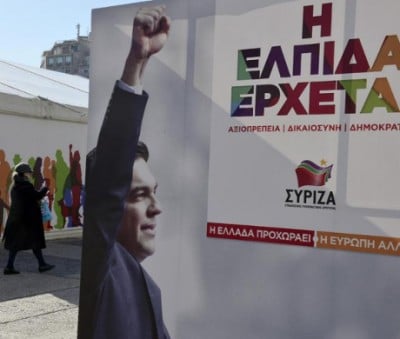Democracy Rising: Syriza, the Struggle for Dignity, Solidarity and the Rebirth of the European Left

On Monday, polls closed in Greece and a new government was sworn into power. Syriza, the populist left-wing party who vehemently opposes the EU austerity measures imposed from Brussels, emerged victorious, forming a coalition with the conservative Independent Greeks party. Thousands in Athens turned out in droves, young and old, to cheer and revel in the victory of Syriza and Alexis Tsipras, the new Prime Minister. Syriza’s commitment towards restructuring EU bank loans and its “Hope is Coming” campaign resonated with voters, who had grown tired of previous Prime Minister Antonis Samaras and his New Democracy Party for negative job growth, stagnant wages, and cooperating with EU and IMF loan schemes.
Syriza was forced into an unlikely partnership with the Independent Greeks party, known for their anti-immigration rhetoric. Tsipras, a skilled speaker with a magnetic personality, now has serious heavy lifting to accomplish. Unemployment stands at 25%; youth unemployment is nearly 50%; and EU loans that must be renewed by February 28th. Not to mention high poverty rates, pensions slashed by the troika, and the criminally insane Golden Dawn party. (1)
Syriza, typically defined as “far-left” by mainstream news sources, is anything but. Tsipras and company are simply trying to create a new social justice movement, by combating inequality using community outreach programs. As reporter Jon Henley explains in The Guardian, health clinics, markets for fresh produce, educational classes and more are popping up in Greece to help poor families stay afloat. (2) By cutting out middlemen, farmers can sell food and receive a larger profit, while folks in need purchase them for a lower price than at a supermarket. Lawyers give free advice to prevent evictions and foreclosures. The Peristeri health clinic, a network of volunteering doctors using donated equipment, treats over 30,000 patients a month, many without insurance. As a movement organizer explains:
“Greece’s solidarity movement was fostering ‘almost a different sense of what politics should be – a politics from the bottom up, that starts with real people’s needs. It’s a practical critique of the empty, top-down, representational politics our traditional parties practise. It’s kind of a whole new model, actually. And it’s working.’”
This quote says it all. If Syriza is called a far-left party by the establishment, this subtle name-calling only reveals the projected fear of “the powers that be”. If they are called dreamers and utopians, it is only because the nay-sayers who praise neoliberalism cannot see outside their own bubble of propaganda. If they are called naïve, it is only because the media puppets of the ruling class do not have the faith and determination needed to imagine a better society.
Yes, Tsipras has used populist rhetoric to argue for a restructuring and/or non-payment of EU loans. He has also softened his tone recently, as his party realizes that conflict or a complete split with the EU would not be beneficial either. While unabashedly Euroskeptic, Syriza does not approve of the nationalist tone heard in other parties such as UKIP or France’s National Front.
Syriza and Podemos, Spain’s leading leftist party in recent polls, offer a new alternative to mainstream political parties and the faceless technocrats who lord over the EU from Brussels. They offer direct democracy to citizens suffering under unfair austerity measures in a crushing spiral of debt, poverty, and uncertainty. They offer a chance for ordinary people to work together, to foster a sense of community, dignity, solidarity. As a Greek cooperative grocer explains in Henley’s piece:
“All these projects, it’s very important to me, are not just helping people who need it, but they represent almost the start of a new kind of society,” Katerini said. “They are run as direct democracies, with no hierarchy. They are about people taking responsibility for their lives, putting their skills to use, becoming productive again.”
A new kind of society indeed. One not ruled by oligarchs, not coerced into failed policies, not overseen by financial bureaucrats. A society where helping the needy is encouraged, where poverty is being fought at its root sources, unlike the richer Western nations (the US, UK, France, and Germany), where politicians routinely speak to the “middle class” as if the less fortunate no longer exist. And it’s not just happening in southern Europe. In northern Syria, the autonomous Kurdish cantons collectively named Rojava is emerging, where democratic self-government and protection of women’s rights are the pillars of its agenda. (3)
These community organizations, political parties, and social programs in Greece, Spain, legitimately represent the rebirth of grassroots democracy, a movement that ebbed along with the environmental movement in the early 1970s. They represent the spirit of community triumphing over corporations; health and wellness over the postmodern malaise of consumerism; egalitarianism and friendship over the cold hostility of international relations. While still in their infancy, they are models that the modern West can learn from and adopt. And while we may not yet see drastic changes in our own societies right now, we can take heart in Syriza’s inspired message: Hope is coming.
William Hawes is an independent author specializing in environmental issues and politics.
Notes:
1) http://www.theguardian.com/
2) http://www.theguardian.com/
3) http://www.gatescambridge.org/

